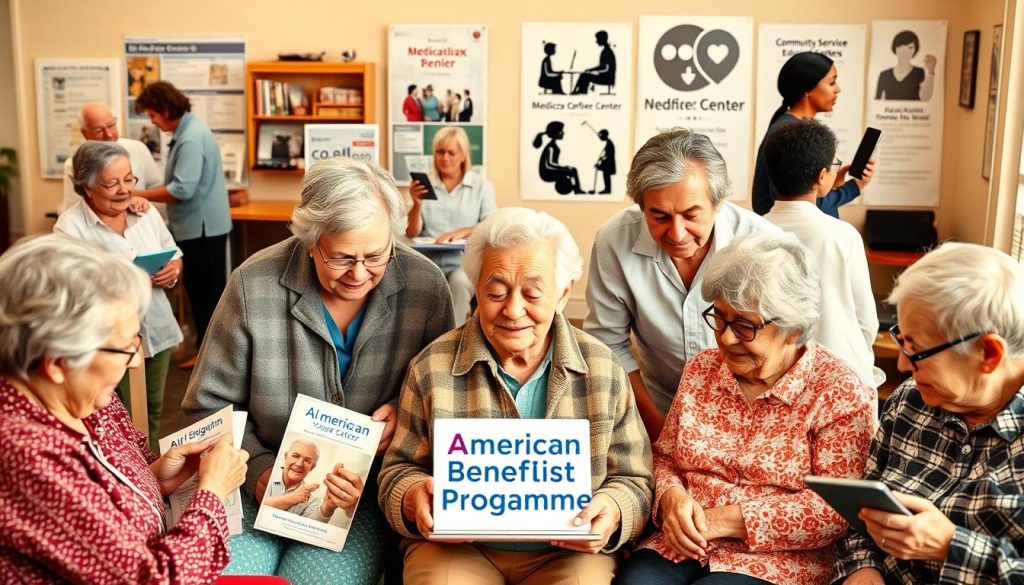Choosing care for aged loved ones can be hard. Have you thought about what makes good elder care? There are many types of care for older people. Knowing these helps make their life better. This article helps you understand senior health care. It shows how to find what your loved one needs.
Key Takeaways
- Understanding your loved one’s unique needs is crucial in selecting the appropriate elder care services.
- Evaluating various types of Sr. Care can enhance safety and improve quality of life.
- Budgeting and understanding costs are essential when choosing senior care options.
- Effective communication with care providers can lead to better outcomes for seniors.
- Assistance programs like Medicare and Medicaid can help manage financial burdens.
- Personalized services, such as meal deliveries and companionship, are vital for holistic elder care.
Understanding Elder Care Services
Elder care helps our aging loved ones when they need it most. The term elder care definition covers many services. These services help with physical, emotional, and social needs of seniors. Families need to know what is available to make the best choice for their loved ones.
Definition of Elder Care Services
Elder care services help older people with their daily lives. This allows them to stay independent but still get the support they need. Services can be as simple as help at home, or as full as medical care depending on what the senior needs.
Different Types of Services Available
There are many types of elder care services out there, including:
- In-home care, where caregivers assist seniors with everyday tasks in their own homes.
- Assisted living facilities that provide housing, meals, and personal assistance.
- Skilled nursing care that offers more intensive medical support for those with severe health conditions.
- Companionship services focusing on emotional support and social engagement.
- Rehabilitation services for seniors recovering from surgery or illness.
Choosing the right service is vital since every senior has different needs. Knowing how much services cost and the help available can guide families. For example, assisted living facilities in the U.S. can cost around $4,300 a month. This is an important detail when looking at senior care options1.
Assessing Your Loved One’s Needs
Evaluating elder needs means looking at both their health and emotional support. It’s key for good care. We’ll cover important points for both health and happiness next.
Physical Health Considerations
When it comes to health for elders, several points matter. These include:
- Mobility limits impacting daily stuff.
- Long-term health issues that need care.
- Doing everyday tasks, like getting dressed or bathing.
Good health care can make their life better. Caregivers should watch for any health changes over time.
Emotional and Social Support
Feeling supported stops elders from feeling lonely. Being with others is key for their mental health. Let’s look at what helps:
- Spending time with family and pals.
- Using local resources like senior centers.
- Doing fun activities that help them meet others.
Caring well means looking after both their health and emotional needs. This helps elders live better.
Types of Elder Care Services
There are many types of help for older people. This help makes it easier for families to make good choices. Each kind of service meets specific needs. It makes sure the elderly get the right support as they get older.
In-Home Care Services
With in-home care, older adults can stay at home but still get help. This help includes daily tasks, managing medicines, and having someone to talk to. It helps them feel independent. Many who get this help may not do some things on their own. This is often because they have illnesses like Alzheimer’s. So, these services are very important2.
Assisted Living Facilities
Assisted living gives a mix of help and freedom. These places help with everyday tasks. Tasks like washing, getting dressed, and taking meds. But, they still let the seniors make some choices on their own. They have plans that match what seniors can pay. But, Social Security doesn’t cover these costs3.
Skilled Nursing Care
Some older adults need more medical care. Skilled nursing facilities provide this. Medicare can pay for short visits. Medicaid helps more with long stays, for those with less money. This ensures they get the help they need4. Each choice offers different benefits, for different needs.
Benefits of Professional Elder Care
Professional elder care helps seniors and their families a lot. It makes seniors’ lives better.
Improved Quality of Life
These services make seniors’ lives better by meeting their needs. They get care made just for them. This helps them stay healthy and do things on their own.
Enhanced Safety and Security
Caregivers make homes safer for older adults. They help with everyday tasks. This makes living at home safer. They know how to stop accidents. Families worry less about their loved ones.
Companionship and Social Interaction
Staying social helps older adults feel less lonely. Care services plan fun activities. These activities make them happy. Seniors make friends, which is good for their minds.

| Benefit | Description |
|---|---|
| Improved Quality of Life | Tailored care enhancing health outcomes and independence. |
| Enhanced Safety and Security | Trained caregivers reducing risks and managing hazards. |
| Companionship | Structured activities promoting social interaction and emotional well-being. |
Elder care meets many needs of seniors. It makes their choices better. It helps them live healthier. It also helps them make friends. Friends are important for feeling happy567.
How to Evaluate Elder Care Providers
Choosing the right elder care providers is very important for families. It’s critical to ask many questions about their services. Ask about their experience with certain health issues and emergency plans.
Key Questions to Ask
Here are important questions to consider:
- What is your experience with patients who have similar health issues?
- How do you manage emergencies, and what protocols are in place?
- Can you provide details about the staff’s qualifications and training?
- What is the staff-to-patient ratio during different times of the day?
- What feedback have past clients provided regarding care quality?
Importance of Credentials and Experience
Checking licenses and background checks is key for safety. The provider’s experience greatly affects the care quality. Research shows that caregivers with good credentials improve the care experience89.
Understanding Costs and Payment Options
Families looking into elder care need to know the costs of elder care. Costs vary by service type and location. For example, in-home care charges by the hour. Assisted living and skilled nursing have monthly fees. This knowledge helps families plan their budgets.
Average Costs of Elder Care Services
The costs for elder care services in 2024 will differ. In-home care might cost $20 to $30 an hour. Assisted living could be $3,000 to $5,000 a month. Skilled nursing usually goes above $8,000 monthly. It’s important to plan for these costs.
Insurance Coverage and Assistance Programs
Finding out about insurance for seniors is key to managing elder care costs. Medicare helps with hospital and skilled nursing bills. Medicaid helps low-income people with long-term care. Families should check all payment options for elder care. This includes private insurance.
For more info on costs and coverage options, go to this page. Find detailed help here101112.
Importance of Communication with Care Providers
Talking well with elder care teams is key to good care. It keeps families in the loop about care choices. Everyone knows what’s going on with their loved one’s health and care plans.
Keeping Family Informed
It’s vital to keep families up to date about health and care plans. A survey shows 63% of patients worry most about safety in health talks13. Good chats with care teams let families help make decisions. This teamwork makes care better and brings families and caregivers closer.
Regular Check-ins and Updates
Checking in often builds trust and openness. With 91.8% of people online, staying in touch is easy14. Emails and texts share news about health and appointments fast. This helps avoid mix-ups and keeps families in the know.
| Communication Method | Advantages | Usage Statistics |
|---|---|---|
| Saves time, allows detailed information sharing | Used by health care providers to improve efficiency | |
| Text Messaging | Quick updates, reminders | Increased use for appointment notifications |
| Telehealth | Convenient access to care | Nearly 25% of patients utilized telehealth services during 2021 |
| Social Media | Cost-effective for broad communication | Growing platform for health information dissemination |
Strong talks with elder care teams are very important. They make sure families feel part of the care process. This helps everyone be clear and work better together. Keeping families and caregivers connected improves care1413.
Finding the Right Care for Special Needs
Looking for care for seniors with special needs takes careful thought. You must consider what they really need. There are two main types of care: memory care services and palliative care. Both provide special support for certain conditions. They help families get through hard times.
Memory Care Services
Seniors with Alzheimer’s or dementia do well in memory care facilities. These places are safe and secure. Caregivers there help with daily tasks and focus on keeping memory sharp. Residents enjoy activities that let them connect with others. This helps improve their life.
Palliative and Hospice Care
Palliative care offers comfort to those with serious illnesses. It deals with pain and brings emotional support to patients and families. When illness is near its end, hospice care begins. It helps families know their loved ones are comfortable. This care makes life better in tough times.
When looking at care options, know what each one offers. Here is how memory care and palliative care compare:
| Care Type | Focus | Ideal For |
|---|---|---|
| Memory Care Services | Cognitive support and safety | Seniors with dementia or Alzheimer’s |
| Palliative Care | Pain management and emotional support | Seniors with life-limiting conditions |
| Hospice Care | End-of-life support | Seniors in the final stages of illness |
To pick the best care, families must research and understand each type. By working with healthcare experts, families can find the perfect match for their needs in special needs elder care151617.
Legal and Financial Considerations
When we talk about elder care, legal and financial issues need careful attention. It’s important to know about advance directives. They help make sure seniors’ health care wishes are followed in emergencies. Also, setting up powers of attorney is key. It lets trusted people make big decisions if seniors can’t do so themselves.
Advance Directives and Power of Attorney
Advance directives are legal papers that share healthcare wishes. They tell doctors what treatments seniors want or don’t want. This includes living wills and healthcare proxies. With these documents, seniors know their values guide their care decisions. A power of attorney lets family or friends handle health care and money matters. This support is crucial in tough times.
Understanding Financial Responsibilities
Money matters in elder care are very important. It’s essential to figure out how to pay for care. This means exploring costs for services like home care or assisted living. Knowing who pays for what helps avoid confusion and makes moving into care smoother.
| Type of Service | Average Cost per Month | Financial Responsibility |
|---|---|---|
| In-Home Care | $4,000 | Private Pay, Medicaid, Long-term Care Insurance |
| Assisted Living | $3,600 | Private Pay, Medicaid |
| Skilled Nursing Facility | $8,800 | Medicare, Private Pay, Medicaid |
Talking about legal stuff for elder care can make choices easier. It’s key to chat with family about money and legal papers. This united approach helps not just seniors. It creates a caring space for all18.
Resources for Finding Elder Care Services
Looking for elder care services can be tough. Luckily, many places can help families find what they need. There are online sites, local programs, and advice from others. They make finding good care for seniors easier.
Online Directories and Reviews
Online tools are very helpful in finding elder care services. Websites let you search for care options near you. You can see what others think, compare services, and learn what to expect. Websites like Medicare.gov and the National Center for Elder Abuse have lots of19info. They tell you about services and safety for seniors.
Other websites focus on elder care reviews and ratings. They help families make smart choices.
Community Resources and Referrals
Community groups are key for elder care too. The National Family Caregiver Support Program helps those caring for older folks20. Local agencies give tips on elder care services and Medicare20. They also offer legal advice.
Groups like Falls Free CT work to keep seniors safe20. They aim to prevent accidents. Families should use these community resources. They offer great support and info on elder care.

Making the Transition to Elder Care
Moving to elder care is a big step, but it can be easier. Involving your loved one in decisions helps them feel in control. It reduces stress. Talking about the good points of elder care eases worries. Websites like Wesley Manor give extra help during this time21.
Tips for Introducing Care Services
Bringing in care services slowly helps seniors adjust better. They get used to new settings and routines. This makes them less anxious. Keeping communication open is key. It builds trust. It lets seniors share their fears. Talking about these fears can make them feel more at ease22.
Ensuring a Smooth Adjustment Period
Creating a welcoming space is important. Getting your loved one to know their caregivers helps them feel less worried. Activities in care homes can prevent loneliness. They help seniors feel part of a community. Being patient and understanding helps everyone feel better. It makes this big change smoother for seniors and their families23.
Source Links
- Does Social Security Pay for Assisted Living? – Senior Services of America
- Social Security Act §1929
- The Types of Housing for Seniors on Social Security
- A Complete Guide To Elder Care Financial Assistance This 2024
- Understanding the Benefits
- Social Security Caregiver Benefits
- The Benefits of Working in Senior Care | Generation
- Paying for Long-Term Care
- How to Assess if an Older Adult Needs Caregiving Help
- Social Security Explained: How It Works and Types of Benefits
- Budget Basics: How Does Social Security Work?
- Understanding Social Security Benefits | The Motley Fool
- Importance of effective communication in healthcare
- The Importance of Communication in Health Care & Tips to Improve
- Explore The Benefits You May Be Due
- Benefits For Children With Disabilities
- A Primer on Planning for a Special Needs Child | Cerity Partners
- There Are Options for Reforming Social Security, But Action is Needed Now
- Federal Websites
- Programs and Services
- Important Paperwork To Consider As You Transition To Senior Living | Traditions of Deerfield
- Taking Over Your Parent’s Finances | Elder Care Alliance
- How To Ease The Transition Into Assisted Living [+ Benefits]

Leave a Reply